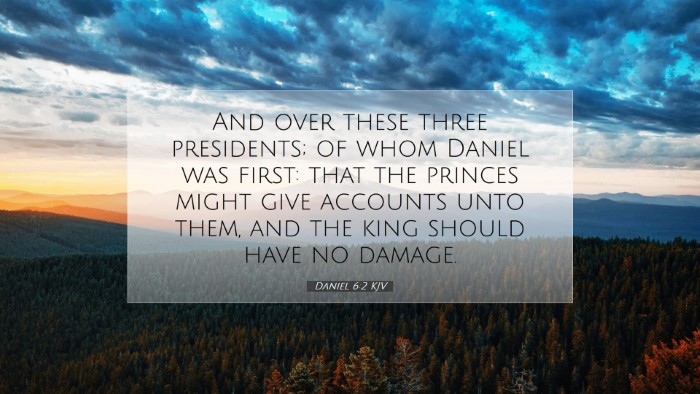Commentary on Daniel 6:2
Daniel 6:2 states:
"And over these three presidents; of whom Daniel was one: that the princes might give accounts unto them, and the king should have no damage." (KJV)
This verse is pivotal in the narrative of Daniel's life in Babylon, illustrating both the administrative structure of the kingdom and the prominent position Daniel held among his peers.
Contextual Overview
The book of Daniel is set against the backdrop of the Babylonian exile, portraying the experiences of Daniel and his companions as they navigate the challenges of serving in a foreign court while remaining faithful to their God. Daniel 6 marks a transition to the Medo-Persian rule, highlighting Daniel’s enduring influence and integrity.
Insights from Commentaries
Matthew Henry’s Commentary
Matthew Henry emphasizes the political acumen of Daniel and God’s providential hand in placing him in such a high position of authority:
-
Divine Favor: Henry notes that Daniel's elevation to a presidency among the three indicates God’s favor and the dignity bestowed upon him as a servant of the Most High.
-
Integrity and Wisdom: Daniel's wisdom was recognized by King Darius, who saw that he had an exceptional spirit within him. This highlights that God often grants wisdom to those who faithfully serve Him.
-
Responsibility: The appointment of the presidents was meant to ensure accountability, reflecting a structured system to safeguard the king’s interests.
Albert Barnes’ Notes
Albert Barnes elaborates on the significance of Daniel’s appointment and the purpose behind the arrangement:
-
Political Structure: Barnes points out that having three presidents helps distribute the responsibilities among trusted officials, indicating a well-organized administration.
-
Protection for the King: The arrangement allowed the king to receive accurate reports and manage his kingdom effectively, thus minimizing potential damage from corrupt practices.
-
Integrity in Governance: By emphasizing the role of the princes accountable to the presidents, Barnes suggests that good governance relies on transparency and accountability.
Adam Clarke’s Commentary
Adam Clarke offers further insights into both the cultural and theological implications of Daniel's role:
-
Cultural Dynamics: Clarke reflects on the significance of a Jewish exile rising to such a status among Gentiles, showcasing that God can elevate His servants irrespective of boundaries.
-
Faithfulness in Adversity: Clarke points out that Daniel’s success is a testament to his unwavering faith and dedication to God, suggesting that faithfulness can lead to honor even amidst opposition.
-
Moral Authority: The kings’ reliance on Daniel demonstrates the influence of divine wisdom in governance, indicating that moral integrity is essential for leadership.
Theological Reflections
This verse invites several theological reflections:
-
God’s Sovereignty: The elevation of Daniel reflects God’s sovereignty in orchestrating events for His purposes, suggesting that He equips His servants for their tasks.
-
Accountability in Leadership: The structuring of leadership roles emphasizes the importance of accountability, a principle that remains significant in contemporary church governance.
-
Role of the Believer: Daniel serves as a model for believers today, illustrating how to maintain integrity and witness in secular environments without compromising faith.
Conclusion
Daniel 6:2 encapsulates themes of leadership, integrity, and divine purpose. Commentators like Matthew Henry, Albert Barnes, and Adam Clarke provide profound insights that encourage pastors, theologians, and students to reflect on the complexities of governance, the role of the believer in society, and the assurance that God reigns supreme over all circumstances, guiding His faithful servants for His glory.


